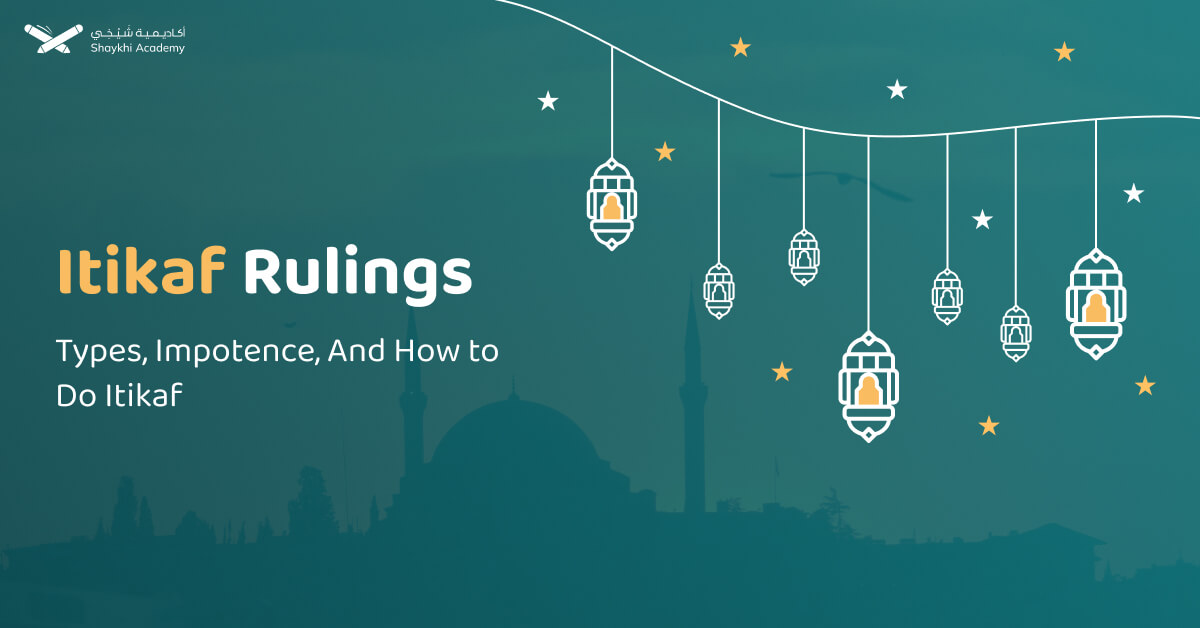Itikaf, a spiritual retreat practiced during the last ten days of Ramadan, serves as a means for Muslims to deepen their connection with Allah and seek purification of the soul. It entails adhering to specific rules, such as intention, location, duration, and engagement in worship, while avoiding worldly distractions.
By performing Itikaf with sincerity and devotion, individuals experience spiritual rejuvenation, seek closeness to Allah, and earn blessings in this life and the Hereafter. Itikaf is a voluntary act of worship, highly encouraged but not compulsory, and offers opportunities for self-reflection, community involvement, and spiritual growth.
In the hushed embrace of the mosque’s sacred walls, a practice as old as time unfolds—a spiritual voyage known as Itikaf. As the bustling world outside fades into a distant murmur, a solitary figure embarks on a journey of introspection and devotion, seeking solace in the tranquility of seclusion.
What Is Itikaf?
Itikaf means to confine oneself to the mosque with the intention of worshiping Allah and seeking His closeness.The primary goal of Itikaf is to dedicate oneself entirely to acts of worship, such as prayer, Quran recitation, supplication, and seeking forgiveness. It is a time to disconnect from worldly distractions and purify the heart.
Itikaf is a Sunnah (recommended act), especially during the last ten days of Ramadan. It becomes obligatory if a person makes a vow (Nazr) to perform it.
for Itikaf
2. Purity:
2. Location:
Permission for Women:
Intention (Niyyah):
Timing and duration of Itikaf
Optimal Timing: The best time for Itikaf is during Ramadan, particularly in the last ten days, as the Prophet Muhammad (peace be upon him) consistently performed Itikaf during this period.
Duration: There is no minimum duration for Itikaf. It can be performed for a few hours, a day, or multiple days, depending on one’s intention and ability.
Itikaf Rules, Requirements, And Conditions
Following Itikaf rules is of utmost importance as it ensures that this act of worship is performed in accordance with the teachings of Islam. To deeply understand the rules of Itikaf, and how to adhere to them properly, many Muslims take Islamic Studies courses at Shaykhi Academy, in which tutors elaborately discuss Itikaf rules.
1. Muslim, Sane, and Discerning:
Itikaf is only valid for Muslims who are sane and able to distinguish between right and wrong. It is not valid for non-believers, the insane, or young children who lack discernment.
2. Purity
One must be free from major ritual impurity (Janabah). Women experiencing menstruation (haydh) or postnatal bleeding (nifas) cannot perform Itikaf and must leave the mosque.
3. Intention (Niyyah):
The intention to perform Itikaf must be made sincerely for the sake of Allah and with the specific intention of seeking closeness to Him through this act of worship.
A sincere intention is required to perform Itikaf. The intention must be made before entering the state of Itikaf.
4. Location:
Itikaf must be performed in a mosque or a designated area within a mosque where congregational prayers are held. It is not valid to perform Itikaf at home or in a place not designated for worship.
Itikaf must be performed in a mosque where congregational prayers are held. However, women can perform Itikaf in any mosque, even if congregational prayers are not held there.
5. Duration:
Itikaf is typically performed during the last ten days of Ramadan, starting from the evening of the 20th day of Ramadan until the sighting of the Eid moon. It is recommended to complete the full ten days, but even a shorter period, such as three days, is acceptable.
6. Permission:
It is important to seek permission from those in authority before beginning Itikaf, especially if it involves staying in the mosque for an extended period, as this may affect the mosque’s routine activities.
A woman needs her husband’s permission to perform Itikaf.
7. Avoiding unnecessary speech:
During Itikaf, one should refrain from engaging in idle talk, gossip, or any speech that is not beneficial or related to worship. The focus should be on remembrance of Allah and spiritual activities.
8. Maintaining ritual purity:
It is necessary to maintain ritual purity (Wudu) and cleanliness throughout the Itikaf period. One should also strive to perform the daily prayers and other acts of worship with diligence.
9. Engaging in worship:
The primary purpose of Itikaf is to engage in worship, including recitation of the Quran, voluntary prayers (Nafl), Dhikr (remembrance of Allah), and seeking forgiveness through repentance. All these means of worship require your knowledge of the Arabic language; so, join Shaykhi Academy’s Arabic courses online to enhance your command of the Arabic language.
10. Avoiding worldly distractions:
Itikaf requires detachment from worldly activities and distractions. Therefore, one should avoid using electronic devices, reading non-religious material, or engaging in activities that divert attention from worship.
11. Seeking knowledge:
Itikaf is an opportunity to seek knowledge and understanding of Islam. One should spend time studying the Quran, Islamic Arabic books , and attending religious lectures and classes.
12. Ending Itikaf:
Itikaf is concluded by leaving the place of seclusion after the sighting of the Eid moon or completing the designated period. It is recommended to perform a prayer (Dua) before leaving, thanking Allah for the opportunity to perform this act of worship.

How to do Itikaf?
Itikaf is a spiritual retreat in Islam where a person secludes themselves in the mosque for a certain period of time, typically during the last ten days of Ramadan. Here are some steps to perform Itikaf:
1- Make an intention (Niyyah):
Make a sincere intention to perform Itikaf for the purpose of seeking closeness to Allah.
2- Choose a Mosque:
Select a mosque where you will be performing Itikaf. It is recommended to choose a mosque with a peaceful environment and facilities for staying.
3- Enter the Mosque:
Enter the mosque with the intention of starting your Itikaf. Make sure to inform the mosque authorities about your intention.
4- Stay in the Mosque:
Remain in the mosque for the entire duration of your Itikaf, focusing on worship, remembrance of Allah, reading the Quran, and supplication.
5- Avoid Worldly Activities:
During Itikaf, refrain from engaging in worldly activities such as using electronic devices, socializing unnecessarily, or indulging in idle talk.
6- Perform Prayers:
Increase your prayers and devotion during Itikaf. Try to pray all five daily prayers in the congregation and engage in additional prayers like Tahajjud and Dua.
7- Read the Quran:
Dedicate time to reading and reflecting on the Quran. Try to complete the recitation of the Quran at least once during your Itikaf. Joining a Quranic recitation course might help prepare you for Itikaf; as it will teach you how to recite the Quran properly.
8- Seek Forgiveness:
Use this time to seek forgiveness for your sins, repent sincerely, and ask for Allah’s mercy and guidance.
9- Engage in Dhikr:
Remember Allah frequently through Dhikr (remembrance), Tasbeeh (glorification), and Istighfar (seeking forgiveness).
10- Reflect and Plan:
Reflect on your spiritual journey during Itikaf, assess your progress, and make plans to continue improving your relationship with Allah after Itikaf ends.
Importance of Itikaf in Ramadan
Itikaf is a deeply spiritual practice that offers numerous benefits, both individually and collectively, and is highly encouraged in Islam for those who are able to perform it.
1- Spiritual purification:
Itikaf provides a unique opportunity for Muslims to purify their hearts and souls through dedicated worship, reflection, and remembrance of Allah. It is a time to detach from worldly distractions and focus on spiritual growth.
2- Seeking closeness to Allah:
Itikaf is a means to draw closer to Allah and seek His pleasure. By secluding oneself in worship, one demonstrates their devotion and sincerity in seeking Allah’s favor.
3- Following the Sunnah:
Itikaf is a practice established by the Prophet Muhammad (peace be upon him) and is considered a highly rewarding Sunnah (tradition) of his. Following the Sunnah brings one closer to the Prophet’s example and earns immense blessings.
4- Increased worship and devotion:
Itikaf encourages increased acts of worship, such as recitation of the Quran, voluntary prayers (Nafl), and dhikr (remembrance of Allah), leading to spiritual rejuvenation and strengthening of faith.
5- Community and mosque involvement:
Itikaf fosters a sense of community and strengthens bonds among Muslims, as many individuals perform Itikaf together in mosques. It also increases mosque attendance and participation in congregational prayers.
6- Reflecting on Ramadan:
Itikaf is often performed during the last ten days of Ramadan, a period of heightened spirituality. It provides an opportunity to reflect on one’s actions during the month and seek forgiveness for any shortcomings.
7- Enhanced focus on worship:
Itikaf allows Muslims to dedicate uninterrupted time to worship and spiritual activities, which can lead to a deeper connection with Allah and a heightened sense of spirituality.
8- Opportunity for self-reflection:
The seclusion of Itikaf provides a conducive environment for self-reflection and introspection. It allows individuals to evaluate their lives, seek forgiveness for past mistakes, and make intentions for positive change.
9- Training for self-discipline:
Itikaf requires individuals to adhere to strict guidelines, such as maintaining ritual purity, avoiding idle talk, and focusing on worship. This helps in developing self-discipline and control over one’s desires.
10- Reward and blessings:
Itikaf is considered a highly rewarding act of worship in Islam. It is believed that those who perform Itikaf with sincerity and devotion will be rewarded by Allah and will receive blessings in this life and the Hereafter.
Is Itikaf compulsory?
Itikaf is not compulsory (wajib) in Islam; rather, it is a voluntary act of worship. While Itikaf is highly encouraged, especially during the last ten days of Ramadan, it is not obligatory.
Muslims who choose to perform Itikaf do so out of their own free will and desire to draw closer to Allah and increase their spiritual connection.
What are the types of Itikaf?
There are two main types of Itikaf in Islam and they change mainly in intention and the reason of doing them, but they are identical in process and steps:
1- Mandatory Itikaf (Itikaf Wajib):
This type of Itikaf is obligatory (wajib) and is performed as a result of a vow (Nadhr) or an oath (Yameen). If someone makes a vow to perform Itikaf or takes an oath to do so, then they are required to fulfill their vow or oath by performing Itikaf.
2- Voluntary Itikaf (Itikaf Nafl):
This type of Itikaf is voluntary and is performed out of one’s own choice and desire to seek closeness to Allah. It can be performed at any time of the year, but it is especially encouraged during the last ten days of Ramadan.
Read: Itikaf for Females.
What Nullifies the Itikaf?
In all the following cases, if Itikaf is nullified, the person should repent to Allah and make up for the lost time by performing Itikaf again if possible.
1- Leaving the designated area:
Itikaf requires the person to remain in the designated area for the entire duration of their Itikaf. If they leave the area without a valid reason, such as a pressing need like using the restroom or responding to an emergency, their Itikaf is considered nullified.
2- Engaging in sexual intercourse:
Itikaf is a state of devotion and worship, and engaging in sexual intercourse while in Itikaf is not permissible. Doing so breaks the state of seclusion and devotion required for Itikaf, and the person must make up for the lost time by performing Itikaf again.
3- Intentional consumption of food or drink:
While in a state of fasting during Ramadan, consuming food or drink is prohibited. If a person in Itikaf intentionally eats or drinks something during the fasting hours of Ramadan, their fast is broken, and consequently, their Itikaf is nullified.
4- Intentional vomiting:
Intentionally inducing vomiting is considered a deliberate act that breaks the state of purity and devotion required for Itikaf. Therefore, if a person intentionally vomits while in Itikaf, their Itikaf is nullified.
5- Invalidating fasting:
Itikaf is often performed during the last ten days of Ramadan, a period of fasting. If a person in Itikaf invalidates their fasting during this time, such as by intentionally breaking their fast without a valid reason, their Itikaf is nullified as well.
Etiquette of Itikaf.
The etiquette of Itikaf is all about our attitude inside the Masjid, and how we spend the days of Itikaf in a manner that adds to our spiritual journey significantly.
1- Cleanliness:
Maintaining personal hygiene and cleanliness is crucial during Itikaf. This includes performing ablution (wudu) regularly, keeping oneself and the surroundings clean, and dressing modestly.
2- Silence:
While in seclusion, it is recommended to engage in acts of worship such as recitation of the Quran, Dhikr (remembrance of Allah), and supplications while maintaining a quiet and peaceful demeanor to enhance focus and concentration.
3- Observing prayers:
It is essential to perform all obligatory prayers on time and engage in voluntary prayers, especially during the night. The night prayers (Tahajjud) are highly recommended during Itikaf for seeking forgiveness and spiritual elevation.
4- Seeking knowledge:
Utilize this time to seek knowledge about Islam, reflect on your actions, seek forgiveness for past sins, and make sincere repentance. Engage in reading the Quran, studying Islamic books, and reflecting on the teachings of Islam.
5- Patience and perseverance:
Itikaf may present challenges such as physical discomfort, spiritual struggles, or distractions. It is important to remain patient, persevere through difficulties, and maintain a positive attitude throughout the seclusion period.
Expand Your Knowledge of Islam with Shaykhi Academy
Delve into the profound teachings of Islam and Immerse yourself in a world of spiritual enlightenment and scholarly exploration with Shaykhi Academy’s comprehensive Islamic Studies Online Course.
From Quranic studies to Islamic history, theology, and jurisprudence, this course offers a rich tapestry of knowledge to deepen your understanding of the faith.
Discover Our Range of Courses:
- Arabic Noorani Qaida: Lay a solid foundation for Quranic studies.
- Online Quran Classes for Kids: Engaging lessons for lifelong learning.
- Tajweed Rules for Kids: Learn to recite with confidence.
- Quran Hifz for Kids: Step-by-step guidance to memorize the Quran.
- Quran for Adults: Introduce yourself to Quran reading and Tajweed rules.
- Online Arabic Courses: Master the language of the Quran.
- Islamic Studies: A wide range of topics related to Islam, including theology, law, Quranic studies, Hadith.
Experience the convenience of flexible online learning that accommodates your schedule and learning pace, while engaging in thought-provoking discussions, interactive lessons, and engaging resources that will inspire and empower you on your quest for knowledge.
Whether you are a beginner seeking foundational knowledge or a seasoned learner looking to deepen your understanding, this course is designed to cater to learners of all levels.

Conclusion:
Itikaf stands as a venerable tradition within Islam, beckoning believers to embark on a profound spiritual odyssey within the sanctity of the mosque. Through this practice, individuals delve deep into introspection, seeking enlightenment and renewal of the soul.
By adhering to the rules, rituals, and etiquettes of Itikaf, Muslims cultivate a deeper connection with Allah, purify their hearts, and draw closer to the teachings of the Quran. As a voluntary act of worship, Itikaf offers immense spiritual rewards and serves as a testament to the believer’s dedication and devotion to their faith.

















































